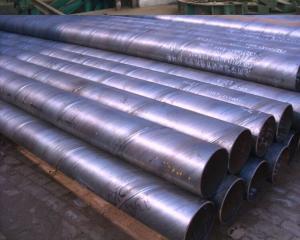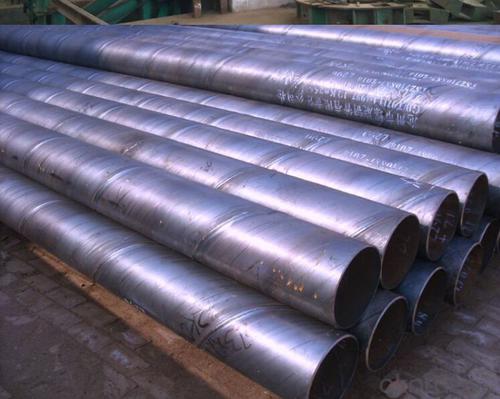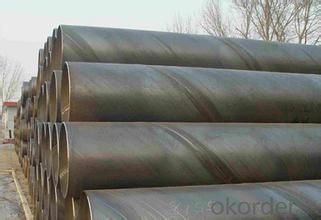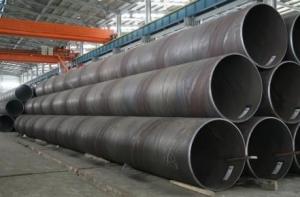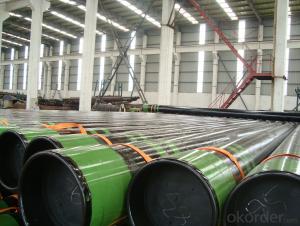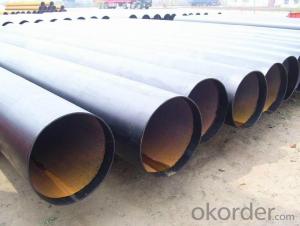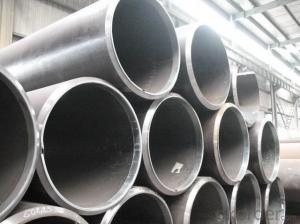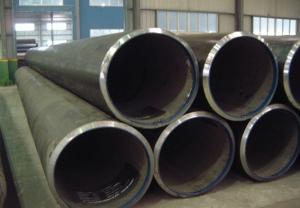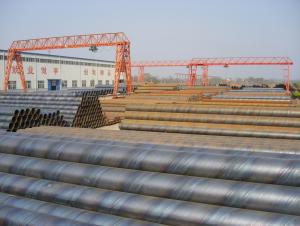SSAW Steel Pipes 2
- Loading Port:
- China Main Port
- Payment Terms:
- TT or LC
- Min Order Qty:
- -
- Supply Capability:
- -
OKorder Service Pledge
OKorder Financial Service
You Might Also Like
Quick Details
| Thickness: | 6 - 28 mm | Section Shape: | Round | Outer Diameter: | 219 - 3500 mm |
Place of Origin: | Tianjin (Mainland) | Secondary Or Not: | Non-secondary | Application: | Oil Pipe |
| Technique: | SAW | Certification: | API | Surface Treatment: | as per your request,Black/Blue 3PE or as per your request |
Special Pipe: | API Pipe | Alloy Or Not: | Non-alloy | ||
| Certificate: | ISO 9001:2008, API, SGS, BV | Material: | Q235A/B,Q345,L360 and X42-X80 grade | Package: | In bulk or bundles |
| Usage: | structure pipe | Main market: | all over the world | Product name: | SSAW Spiral Steel Tube |
| End: | Beveled End |
FAQ of SSAW Steel Pipes:
①How is the quality of your products?
Our products are manufactured strictly according to national and internaional standard, and we take a test on every pipe before delivered out. If you want see our quality certifications and all kinds of testing report, please just ask us for it.
Guaranteed: If products’ quality don’t accord to discription as we give or the promise before you place order, we promise 100% refund.
②How about price?
Yes, we are factory and be able to give you lowest price below market one, and we have a policy that “ for saving time and absolutely honest business attitude, we quote as lowest as possible for any customer, and discount can be given according to quantity”,if you like bargain and factory price is not low enough as you think, just don’t waste your time.Please trust the quotation we would give you, it is professional one.
③Why should you chose us?
Chose happens because of quality, then price, We can give you both.Additionally, we can also offer professional products inquiry, products knowledge train(for agents), smooth goods delivery, exellent customer solution proposals.Our service formula: good quality+good price+good service=customer’s trust
SGS test is available, customer inspection before shipping is welcome, third party inspection is no problem.
Any question, pls feel free to contact us !
SSAW Steel Pipes Images:
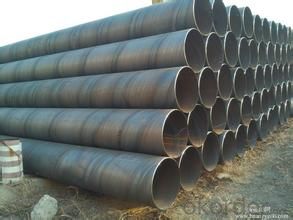
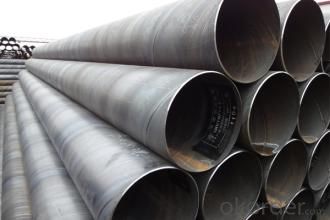
- Q: How do you solder purple copper plate and steel tube?
- The copper plate and the steel tube are brazed by brazing or argon arc welding.
- Q: How are steel pipes installed underground?
- Steel pipes are installed underground through a process called trenching, where a trench is dug to the desired depth and length. The steel pipes are then placed in the trench and secured using various techniques such as welding or threading. The trench is then backfilled, ensuring proper compaction around the pipes to provide stability and prevent movement.
- Q: What is the difference between ERW and SAW steel pipes?
- ERW (Electric Resistance Welded) steel pipes are manufactured by rolling metal sheets and then welding the seams using high-frequency electrical currents. SAW (Submerged Arc Welded) steel pipes, on the other hand, are formed by welding the seams using a submerged arc welding process. The main difference between the two lies in the welding method and the resulting quality of the weld. ERW pipes tend to have a smoother and more consistent weld, while SAW pipes have a slightly rougher weld due to the submerged arc process. Additionally, SAW pipes are generally used for larger diameters and thicker walls, while ERW pipes are commonly used for smaller diameters and thinner walls.
- Q: Can steel pipes be used for fencing or railing?
- Yes, steel pipes can be used for fencing or railing. Steel pipes are durable, strong, and resistant to weather conditions, making them a suitable choice for fencing or railing applications. They provide stability and security while also offering an aesthetically pleasing appearance. Additionally, steel pipes can be easily customized and installed, making them a popular choice for fencing and railing projects.
- Q: What are the typical lengths of steel pipes?
- The typical lengths of steel pipes vary depending on the industry and application. However, common lengths for steel pipes range from 18 to 40 feet.
- Q: Are steel pipes suitable for use in food processing industries?
- Yes, steel pipes are suitable for use in food processing industries. Steel pipes are highly durable, resistant to corrosion, and can withstand high temperatures and pressures, making them ideal for transporting various food products and fluids. Additionally, steel pipes are easy to clean, maintain hygiene standards, and comply with food safety regulations, making them a reliable choice for the food processing industry.
- Q: Seamless steel pipe and welded pipe what is the difference?
- Seamless steel pipe is made of solid round tubes and perforated without gaps. The welded pipe is made of steel or strip after welding and has a slit. Generally seamless pipe can be greater pressure on the city.
- Q: Are steel pipes resistant to chemicals and corrosion?
- Generally speaking, steel pipes possess a high resistance to chemicals and corrosion. To further enhance this resistance, protective layers such as zinc or epoxy are often applied to steel pipes. These coatings serve as a barrier, preventing direct contact between chemicals and the steel, thus reducing the risk of corrosion. Moreover, steel itself possesses inherent corrosion-resistant properties, making it a suitable material for applications where exposure to chemicals and corrosive elements is common. However, it is worth noting that the level of resistance may vary depending on the specific type of steel, the chosen coating, and the particular chemicals or corrosive substances involved. Therefore, it is advisable to seek advice from experts and carefully consider the specific requirements of the intended application to ensure the appropriate selection of steel and protective measures, thereby maximizing resistance to chemicals and corrosion.
- Q: How are steel pipes used in the manufacturing of geothermal systems?
- Steel pipes are used in the manufacturing of geothermal systems primarily for their durability and heat resistance. These pipes are used to transport geothermal fluids, such as water or steam, from the underground reservoir to the surface, where they can be utilized for heating or electricity generation. The high strength and corrosion resistance of steel pipes make them ideal for withstanding the harsh conditions and high temperatures encountered in geothermal applications. Additionally, steel pipes can be easily welded and connected, allowing for efficient installation and maintenance of geothermal systems.
- Q: How seamless steel tube is formed?
- Seamless steel tubes are formed by cold drawing and hot rolling.
Send your message to us
SSAW Steel Pipes 2
- Loading Port:
- China Main Port
- Payment Terms:
- TT or LC
- Min Order Qty:
- -
- Supply Capability:
- -
OKorder Service Pledge
OKorder Financial Service
Similar products
Hot products
Hot Searches
Related keywords
